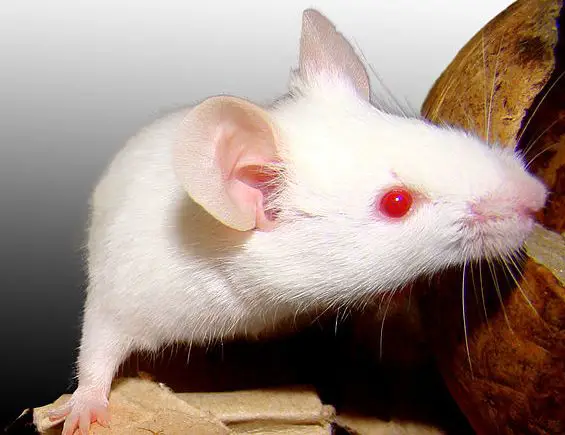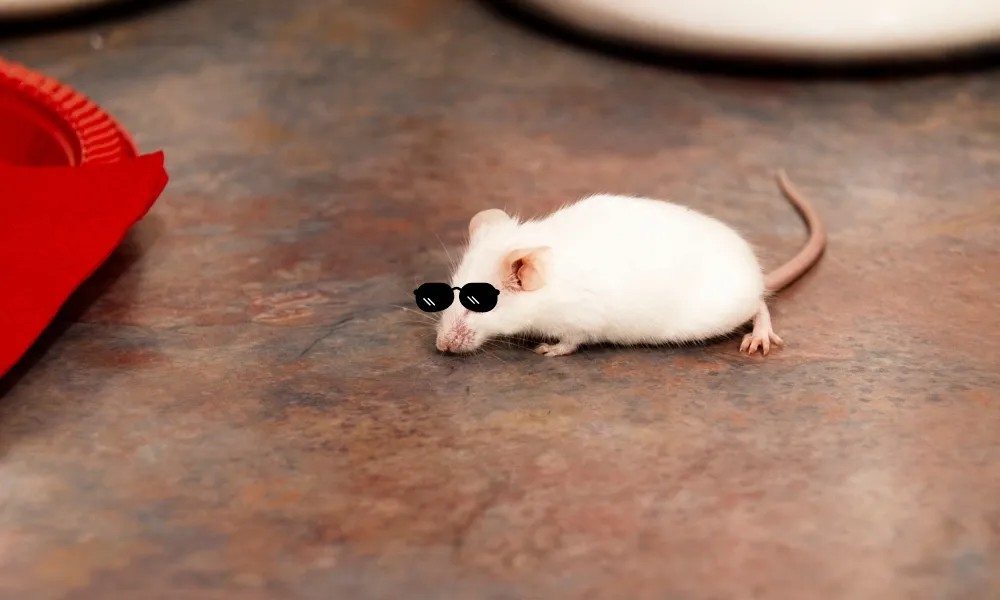When I was a kid, I normally hear the nursery rhyme “3 blind mice”. And maybe you did it too! So does it mean mice are really blind?
Here’s what I found out:
Mice are not blind. They just have poor eyesight.
Although when they are born they are completely blind. But after a few weeks, their eyes begin to open.
This eye has low vision, and they use it to adapt very well to their environment with the combination of other senses. Their eyes are perfectly positioned on their head, allowing them to detect movements.
They can do this even though their eyesight range is short.
Mice can sense movements up to 45 feet away from their position. This is true regardless of their struggle to focus on an object.
But if they are not blind, how good is their eyesight?
Let’s read more to find out.
Table of Contents
How Good Are Mice’s Eyesight?
Mice, just like their cousins ‘’rats’’, have extremely poor eyesight.
They frequently hit objects in their surroundings. In addition, they also find it hard to see some colors, most especially red.
Mice only focus their attention on objects that are much closer to them (usually between 1 – 2 feet away).
Mice are nocturnal animals that find it okay to hunt in the dark.
This makes them greatly dependent on their whiskers to go from one point to the other.
Their whiskers inform them if they are about to bump into something, or that they should run away.
Because these little creatures can’t see much, they usually leave signature smears on their bodies as they move.
They frequently brush up against walls to communicate with each other.
In addition, mice also do it as a way of locating their way back to their nest.
What Can Cause Blindness In Mice?
Two main factors can cause blindness in mice. These factors are 1). Retinal Degeneration 2). Transgenics and Knockouts
Retinal Degeneration
Retinal degeneration is a simple disorder in mice caused by a change in their genes.
It can happen due to environmental damage to the retina or any other factor. Unfortunately. this is not curable.
Transgenesis and Knockouts
Transgenics and knockouts in mice are the processes whereby genes are transferred from another animal. This can be done naturally or by artificial insemination.
This transferred gene is called ”Transgene” and it can change the mice’s phenotype which can make them blind.
FAQ:
Are Mice Blind At Night?

No, mice are not blind at night. They just do not see well in the dark.
In fact, they are nocturnal animals. It means that mice are more active during the night.
Compared to humans, their vision is quite weak. If they were humans, they would be considered blind.
But their advantage over humans is the fact that their eyes have special aids that help them survive in the dark.
According to research, mice’s eyes are adapted to detect movements in low light, providing them an edge over their nighttime predators.
Are Field Mice Blind?
No, field mice are not blind. Similar to house mice, field mice have very poor sight. In fact, they largely depend on their strong senses to survive in the wild.
Are Mice Born Blind?
Yes, mice are born blind.
They are born with their eyes closed just the same way some other mammals are born.
After 13-14 days, the baby mice (aka pups) can get up. At the same time, their eyes will gradually open but are not entirely clear to see things.
After 21 days, young mice start leaving their nest in search of food and nesting materials.
At this time they are old enough to build their own nest and raise their own families.
In addition to being color-blind, Mice have a short-range vision of 2 feet.
Surprisingly, they can detect as far as 45 feet away.
Are Albino Mice Blind?
No, albino mice are not naturally blind.
They only have difficulty seeing objects more than other species of mice.
Albinos’ visual systems differ from those of normally pigmented mice in several ways.
In a nutshell, their eyes lack pigmentation or melanin.
This means there is no pigment in the iris. That’s why the iris seems red (the only color remaining is blood in the capillaries).
Albinos also have a lack of pigment deeper in the eye, which ordinarily absorbs light.
The light inside the eye scatters without it.
As a result, the albino’s eye is overwhelmed with light.
The light causes retinal deterioration over time. As a result, albino mice have very weak vision but are not blind.
Are White Mice Blind?
No, white mice are not blind.
Just like albinos, they find it difficult to detect objects due to a lack of pigmentation in their iris.
When light falls on their eyes, it disperses and does not allow them to focus on an object.
Are Red Eye Mice Blind?

No, red-eye mice are not blind.
They have ruby/pink/red eyes which have lower vision than dark-colored eyes.
Red-eye mice do not sense red light. Instead, they only see a blue and green light. This is comparable to people who are colorblind to red and green.
Because of this, red-eyed mice move slowly. They do this in an attempt to improve their vision.
In any case, red-eye mice don’t rely on their vision to get around their environment.
Recap
In summary, mice are not blind, they just have poor eyesight.
This is true for all their species – the albinos, red-eye mice, white mice, etc.
Retinal Degeneration, Transgenics, and Knockouts are the common factors that can cause blindness in them.
These factors can be natural as well as artificially driven in the laboratory.
Now that you are aware of mice’s poor vision, would you like to know how they cope with living with each other?
Read our article “Do Mice Live in Groups to learn more about mice.
